What we know about Omicron and its impact on Africapublished at 17:55 GMT 14 December 2021
Here's what we know about the Omicron variant so far and how its discovery is impacting the continent.
Read MoreHere's what we know about the Omicron variant so far and how its discovery is impacting the continent.
Read MoreWe're back on Wednesday
That's all from the BBC Africa Live team for now. We'll be back on Wednesday morning.
Until then there will be an automated service and you can find the latest updates on the BBC News website, or listen to our podcast Africa Today.
Our African proverb of the day:
Quote MessageHe who procrastinates, his son does not grow."
A Somali proverb sent by Salat in Mogadishu, Somalia.
Click here to send us your African proverbs.
And we leave you with a scenic view in the lake city of Bukavu in the Democratic Republic of Congo:
Allow Instagram content?
This article contains content provided by Instagram. We ask for your permission before anything is loaded, as they may be using cookies and other technologies. You may want to read Meta’s Instagram cookie policy, external and privacy policy, external before accepting. To view this content choose ‘accept and continue’.
Tesfalem Araia
BBC Tigrinya
Eritrean cyclist Biniam Girmay has been named Africa's best cyclist of the year by organisers of the La Tropicale Amissa Bongo, an annual cycling tour held in Gabon.
The 21-year-old clinched his second consecutive award ahead of South African Ryan Gibson and two of his countrymen; Merhawi Kudus and Henok Mulubrehan.
Allow X content?
This article contains content provided by X. We ask for your permission before anything is loaded, as they may be using cookies and other technologies. You may want to read X’s cookie policy, external and privacy policy, external before accepting. To view this content choose ‘accept and continue’.
Eritreans dominate cycling competitions in Africa in almost all categories, both at the individual and at national team level.
The Horn of Africa nation has recorded six wins at the men's elite African Road Championships, more than any other country, in the last decade.
The country's biggest feat globally came at the 2015 Tour de France when Daniel Teklehaimanot became the first African to wear the polka dot jersey and Merhawi Kudus, then 21, was the field's youngest rider.
Several Eritrean professional cyclists have been recruited by clubs in Europe and South Africa over the years.
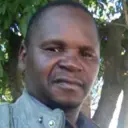 Jose Tembe
Jose Tembe
BBC News, Maputo
Police in Mozambique say they have detained three men in possession of two rhino horns that they had allegedly intended to sell in the capital Maputo.
The men, aged between 28 and 41, were arrested on Friday night following a tip-off, a police spokeswoman said..
“The horns were in a briefcase and they were traveling in a van transporting passengers to Maputo,” she added.
The men said they were intermediaries and that they had received the horns from their boss in the southern district of Moamba, on the outskirts of Maputo.
Trafficking of wild trophies such as rhino horns and elephant tusks, is common in Mozambique.
The final destination of the trophies has been Asian countries such as China. Some of the trophies result from poaching from national and foreign parks such as South Africa’s Kruger National Park.
The music and dance style from the two Congos is a fundamental part of the countries' identities.
Read More Rhoda Odhiambo
Rhoda Odhiambo
BBC health reporter, Nairobi
Early data from South Africa suggest that the Omicron variant of Covid-19 may lead to less severe infections that earlier variants that hit the country.
The study conducted on people who had taken the Pfizer jab found that it continued to offer protection from Omicron from being admitted to hospital. Those who had two doses were 70% less likely than unvaccinated people to need treatment.
This research by private health insurers Discovery Health is the first real-time study looking at the impact of vaccines against the Omricon variant.
South Africa is currently experiencing a spike in Covid-19 cases that have been linked to it.
South African scientists have maintained that the majority of patients have milder forms of the disease and recovered within three days.
Last week, Pfizer said a booster shot of their vaccine can be as effective against the new variant.
However, the World Health Organization says that the current vaccines would still prevent severe cases.
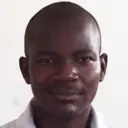 Ishaq Khalid
Ishaq Khalid
BBC News, Abuja
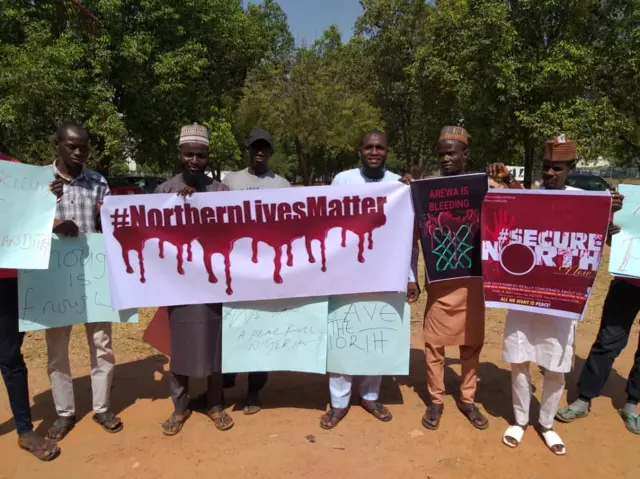
There have been protests in 19 states as well as in the capital, Abuja
Police in the northern Nigerian state of Katsina have dispersed protesters who had gathered in the state capital demanding the authorities to do more to end worsening insecurity in the country.
Katsina is the home state of President Muhammadu Buhari.
There has been growing disenchantment with his government with protesters saying it’s not doing enough to tackle armed criminal gangs behind a wave of killings and kidnappings for ransom.
Katsina is one of the states worst affected by the violence targeting communities, travellers and students.
State police spokesperson Gambo Isa told the BBC that the protesters did not inform the local authorities before the protests.
But one of the organisers said that had told the national authorities as this was part of a protest across northern Nigeria.
The UK has removed all 11 African countries from its red list, which severely restricted travel between those states and the UK.
Only British or Irish nationals or those with residency in the UK could re-enter the country.
The restrictions were first imposed last month in order to slow the spread of the Omicron variant of Covid-19.
Some critics had described the measure as racist as only African nations appeared on the red list.
Initially they were all in southern Africa, including South Africa and Botswana, where Omicron was first identified, but Nigeria was later added.
The 11 countries affected are:
The restrictions will be lifted at 04:00 GMT on Wednesday.
"Now that there is community transmission of Omicron in the UK and Omicron has spread so widely across the country the travel red list lis now less effective in slowing the incursion of Omicron from abroad," Health Minster Sajid Javid told the UK's parliament.
Arsenal stripped Pierre-Emerick Aubameyang of the captaincy to "defend the interests" of the club, says manager Mikel Arteta.
Read MoreHaimanot Ashenafi
BBC Amharic
The families of two of four journalists who were recently arrested in Ethiopia have told the BBC that their whereabouts are unknown.
Kibrom Worku was picked up two months ago accused of inciting violence and he has not been seen since a bail hearing last month. On Monday the police said that he had been released, but he has not returned home and his father told the BBC that he was worried about his son’s health.
Selam Belay, the wife of Tamrat Negera, who was arrested on Friday, said that all she wants to know is whether her husband is dead or alive.
His family have been searching prisons in and near the capital, Addis Ababa, and they were told that he had not been seen.
Meaza Mohamed, who was detained last week, is being held by police in Addis Ababa and her family saw her on Sunday. Her brother told the BBC that they would visit again today.
Eyasped Tesfaye was arrested at his mother’s house last week. Friends and family visited him at a police station in Addis Ababa.
Except for Mr Kibrom, none of the others have appeared in court or have had access to a lawyer.
Ethiopia is currently under a state of emergency because of the ongoing civil war. As a result some rights have been suspended.
The authorities though have not explained the reasons behind the most recent three arrests and BBC requests for comment from officials have so far not been answered.
“We are shocked at several cases of arrested journalists that have been reported to us in the last one week,” the Committee for the Protection of Journalists has said.
“Since the state of emergency the government has ratcheted up the targeting of journalists for arrests, and detaining them without due process. Unfortunately, these latest arrests seem to fit in with that pattern," CPJ said.
 Ishaq Khalid
Ishaq Khalid
BBC News, Abuja
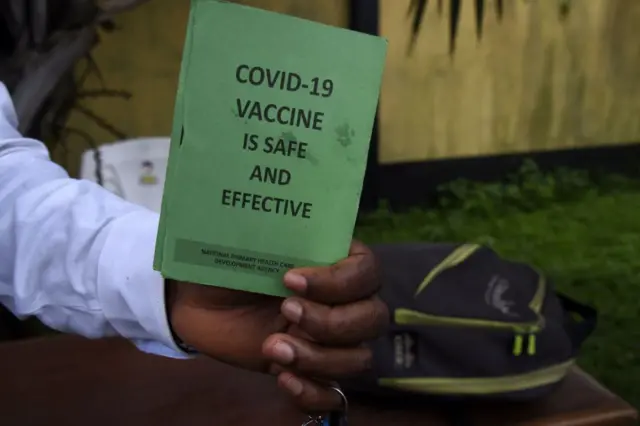 Image source, Getty Images
Image source, Getty ImagesUptake of the vaccine remains low
The authorities in Nigeria have announced that they will destroy close to one million expired doses of Covid-19 vaccines.
They say the jabs were delivered by international donors just before their expiry date, which did not give them enough time to distribute them around the country.
This is the first time the Nigerian health authorities have announced the number of vaccine doses to be destroyed.
The head of the National Primary Healthcare Development Agency, Dr Faisal Shuaib, told reporters that his agency was working with the country’s drug regulator to set a date for the destruction of the expired vaccines.
The authorities say no expired jabs have been administered in the country.
So far only 2% of Nigeria's 200 million people has received two doses of the Covid vaccine.
The authorities now say they will no longer accept vaccines with short-shelf-life.
In Senegal, health authorities there say at least 200,000 vaccines have expired and another similar number are set to pass their end of of use date by December, the Reuters news agency reports.
A low uptake of the vaccines has been blamed.
"The main problem is vaccine hesitation... the number of cases is decreasing. They ask: 'why is it important to get vaccinated if the illness is not there now'?", Ousseynou Badiane, who is in charge of Senegal's vaccine rollout, is quoted as saying.
 Nicolas Negoce
Nicolas Negoce
BBC News
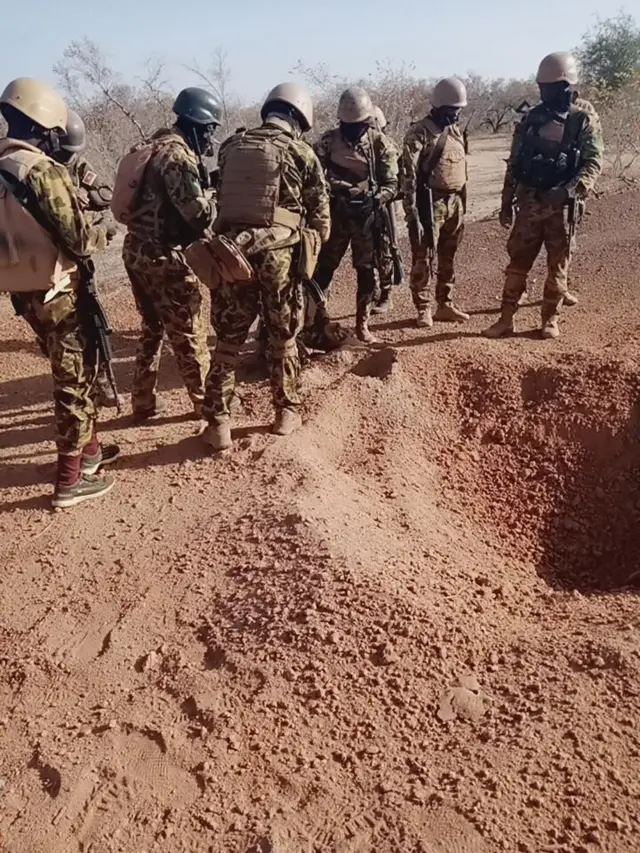 Image source, Burkinabe army
Image source, Burkinabe armyAt least 100 militants have been killed in the past two weeks following a joint military offensive by soldiers from Burkina Faso and Niger, a statement from the Burkinabe army says.
Twenty suspects were also arrested and a significant amount of weapons was seized during the operation. The statement added that at least 14 soldiers were killed during the operation.
The two countries have been facing growing security challenges mostly driven by Islamist militants allied to al-Qaeda and the Islamic State group operating in the Sahel.
In Burkina Faso, the government has been under intense public pressure to deal with the growing insecurity.
Last week, Burkina Faso President Roch Marc Christian Kabore sacked Prime Minister Christophe Joseph Dabiré and nominated Lassina Zerbo in what analysts said was an attempt to show a change of tactic in dealing with insecurity in the country.
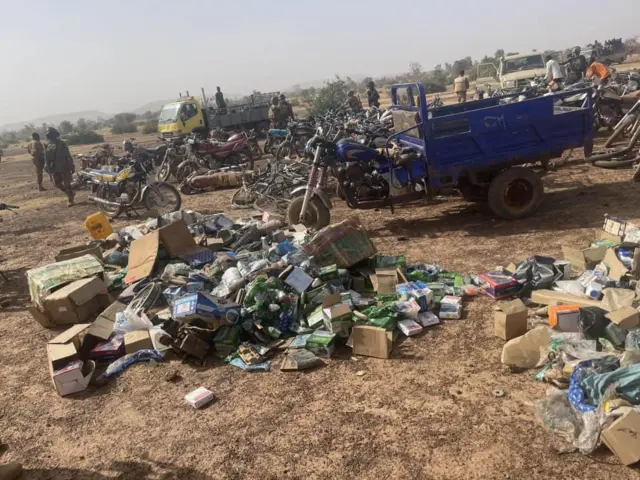 Image source, Burkinabe army
Image source, Burkinabe armyFormer Nigeria coach Gernot Rohr says the Super Eagles are a 'united group' and can do well at January's Africa Cup of Nations.
Read More Rhoda Odhiambo
Rhoda Odhiambo
BBC health reporter, Nairobi
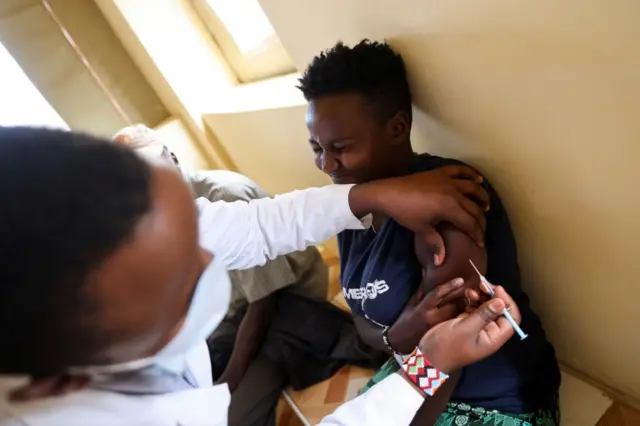 Image source, Reuters
Image source, ReutersOnly 8.1 million Kenyans have received a Covid-19 vaccine
A high court in Kenya has suspended a government directive seeking to bar unvaccinated people from accessing in person services in state offices.
The petition filed by businessman Enock Aura said the directive, which was to be implemented next week, was unconstitutional and discriminatory.
High Court Judge Anthony Mirima said his ruling would remain in force until the case was heard on 4 January 2022 and until a decision made.
In November, Health Minister Mutahi Kagwe said that the directive was aimed at getting more Kenyans to get the jab.
The government had set a target of vaccinating 10 million Kenyans by the end of the year.
Only 8.1 million people have received a Covid-19 vaccine and more than three million have received a two doses.
The suspension of the directive also comes days after a number of hotels and malls announced that they would not allow unvaccinated Kenyans into their premises.
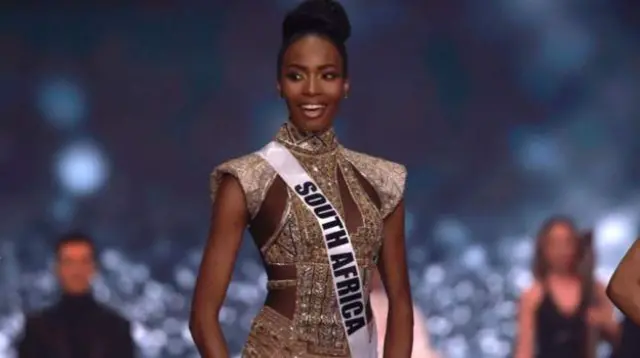 Image source, AFP
Image source, AFPLalela Mswane emerged second runner-up in the competition
Miss South Africa Lalela Mswane has said she "followed what felt right" regarding her participation in the Miss Universe contest.
The South African government withdrew its support for the beauty queen after public pressure citing Israel's treatment of Palestinians.
Mswane said she "chose faith over fear", explaining her decision to proceed.
The pageant organisers had urged participants to shun politics.
Mswane emerged second runner-up in the Miss Universe competition won by India's Harnaaz Sandhu.
A group of Russian scientists have arrived in South Africa to study the new coronavirus variant, Omicron.
Russia's foreign ministry has tweeted a video of the team's arrival, adding that the plane was also carrying a mobile laboratory.
Allow X content?
This article contains content provided by X. We ask for your permission before anything is loaded, as they may be using cookies and other technologies. You may want to read X’s cookie policy, external and privacy policy, external before accepting. To view this content choose ‘accept and continue’.
The arrival comes days after South Africa's President Cyril Ramaphosa invited experts from different countries to join the country's scientists to study the new variant and its mutation.
South Africa has seen a rise in coronavirus infections which have been attributed to the Omricon variant, which was first detected in the country last month.
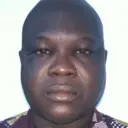 Nichola Mandil
Nichola Mandil
BBC News, Juba
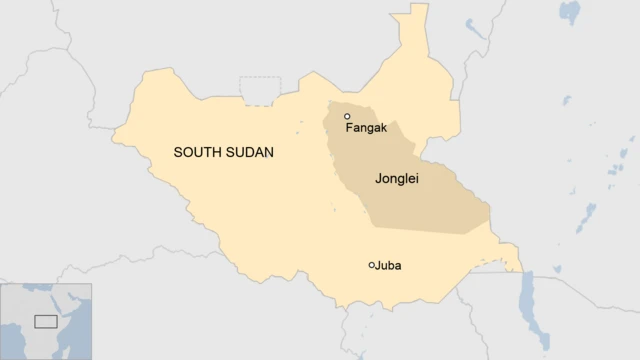
The World Health Organization (WHO) says it is investigating the deaths of nearly 100 people who succumbed to a yet to be identified disease in Fangak, Jonglei State, in South Sudan.
Last week, the ministry of health reported that an unknown disease had killed dozens of people in the area which is one of the worst hit by recent flooding.
A local health official said initial samples collected in the area returned negative test results for cholera.
"We decided to send a rapid response team to go and do risk assessment and investigation; that is when they will be able to collect samples from the sick people – but provisionally the figure that we got was that there were 89 deaths,” WHO’s Sheila Baya told the BBC.
She said Fangak area was not reachable by land due to flooding and the team was waiting for a helicopter to return them to the capital, Juba, on Wednesday.
 BBC Monitoring
BBC Monitoring
The world through its media
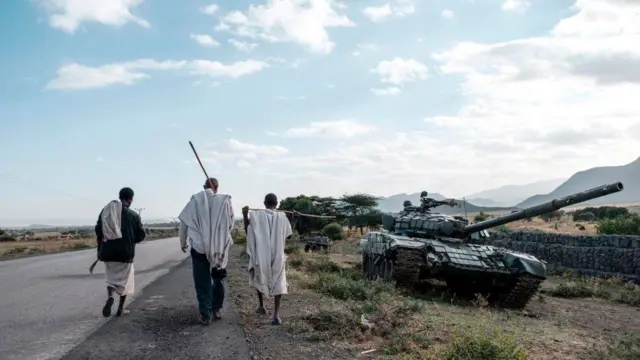 Image source, AFP
Image source, AFPThe fighting in Ethiopia has worsened the humanitarian crisis
Ethiopia has rejected a plan by the UN's top human rights body to hold a special session on Friday to discuss the human rights situation in the country.
Ethiopia's foreign ministry said that it was "perplexed and saddened" by the UN Human Rights Council's decision to hold the session at the request of the European Union., external
The Ethiopian government called on member states of the UN rights body to reject and vote against the special session.
"What should have been a priority for the council, instead, was the urgent task of carrying out an investigation into the violations of human rights and atrocities committed by the TPLF [Tigray People's Liberation Front] terrorist group in Afar and Amhara regional states," the government said in a statement.
The UN rights council said the session will discuss the “grave human rights situation” in Ethiopia.
Ethiopia announced at the end of November that it had set up a task force to deal with human rights violations during the conflict in the north of the country between its military and TPLF rebels.
It said that was in line with the recommendations of a joint report, external by the Ethiopian Human Rights Commission and the UN human rights office.
South African swimmer Tatjana Schoenmaker is still struggling to process her Olympic success.
Read MoreA university in Nigeria has confirmed an incident where a final year student was attacked and set ablaze for refusing to join a secret society, known as cults.
The student was rescued and is being treated at hospital with serious burn wounds.
On Monday, administrators at Osun State University said that they were working with police to ensure the suspected cultists are arrested.
The university discovered the incident after the student failed to show up for exams. They contacted his parents who said he had been attacked and was being treated at hospital.
Eyewitnesses said they heard the student shout that he would not join the cult before he started screaming for help.
Violence around the cults has been the cause of a lot of concern in Nigerian universities and some schools.
Read more: